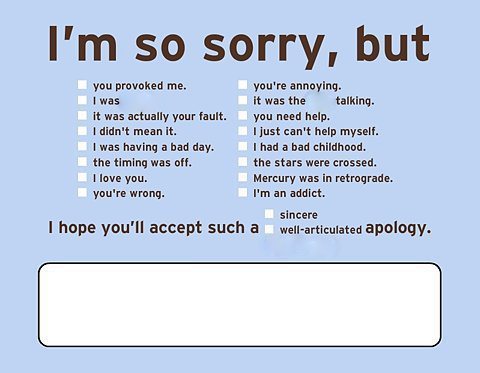The Art of the Apology
 My apologies if I offend your intelligence, but this post is about a simple act that many of us mess up: The apology, especially the parental apology.
My apologies if I offend your intelligence, but this post is about a simple act that many of us mess up: The apology, especially the parental apology.
I can count on one hand (OK, one finger), the number of times my father apologized to me. Maybe it wasn’t one of the things that the greatest generation was very great at, but I have vowed to do a better job of teaching my kids the art of the apology. Like most lessons, apologies are best learned by example.
Our kids give us plenty of opportunities to apologize, especially when we lose our temper, over-punish, or don’t take their feelings into account. These opportunities to apologize accomplish two things: It gives me a chance to mend any hurt in the relationship, and it shows kids the correct way to apologize.
Here are some dos and don’ts when it comes to apologies –
Don’t: Apologize for their feelings.
You see this so many times when reading the news. “I am sorry if I offended anyone.” Or “I am sorry if I hurt anyone’s feelings.” The problem with this type of apology is that it isn’t an apology. We can only apologize for our own actions, not someone else’s feelings. The other problem with this type of apology is that it can be easily misinterpreted to mean: “I’m sorry you are so sensitive.”
Do: Apologize for your actions.
If we can only apologize for our actions, that is where we should focus. For instance: “I’m sorry I yelled at you.” Keep it simple. Family, especially kids, will want to move on and forgive us, so don’t belabor the point.
Avoid the “But” Statement:
Sometimes when we keep talking, we end up taking back the apology with a “but” statement: “I’m sorry I yelled at you. But if you wouldn’t fuss so much at dinner time, I wouldn’t get so angry.” I have used this type of apology too many times. It doesn’t work because it isn’t really an apology. It is saying that my yelling is actually my kids fault. If he didn’t fuss, I wouldn’t have yelled. Not the best way to apologize.
Use “I” instead of “Mommy” or “Daddy.”
Parents are one of the few people who talk about themselves in the third person. When you think about it, it’s a bit weird. I’m not exactly sure why we do it, but I’ll leave that thought to another column. I think it can get in the way of the apology by adding distance. Instead of saying “Daddy is sorry about what he did,” say “I’m really sorry for yelling.”
Add: “There was no excuse.”
For instance: “I’m sorry I yelled at you. There was no excuse.” This is a great way to give kids the message that we can’t excuse our actions. If we want our kids to take responsibility for their actions, this a way we can model how to do it.
An apology doesn’t negate the bad thing they did. This is an important thing to remember. Just because you lost your temper and apologized doesn’t mean they get off without a punishment. If you yelled at your daughter and told her to go to her room for twenty minutes, you can apologize for the yelling, but still enforce the twenty minute time-out.
Avoid apologizing before the offense.
This is the pre-offense apology: “I’m sorry if this offends you, but … (add offending statement here).” A variation on this is “No offense, but ….” A good rule of thumb is that if you need to pre-apologize, you should probably not say whatever you were going to say. That way, you can avoid the possibility of offending in the first place. If you are wondering if I violated my own rule at the beginning of the column, you are correct!
Keep these ideas in mind the next time you are considering whether to apologize or not, and see if it makes a difference.
Book Updates: I am co-authoring a book on parenting kids with Aspergers called The Don’t Freak Out Guide to Parenting Kids with Aspergers! We hope to have it on the shelves by September. We are presently working on the question & answer section. If you have a kid with Aspergers and have a parenting question, please send me an email at neil@neilmcnerney.com.
Neil McNerney is a licensed counselor and author of Homework – A Parent’s Guide To Helping Out Without Freaking Out! For more information go to www.neilmcnerney.com